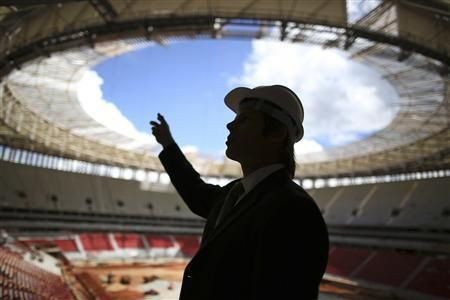World Cup 2014: Brazil To Miss FIFA Deadline For Stadiums

More than half a million tickets have been sold for the Confederations Cup in June, but host nation Brazil has yet to finish the main stadiums to be used in the dress rehearsal for the 2014 soccer World Cup.
On the eve of yet another FIFA deadline, Brazil has delivered only three of the six venues for the eight-nation warm-up starting in two months.
World soccer's governing body FIFA had demanded that all six stadiums be ready by this past December but construction delays forced it to extend the deadline until April 15. Even with that extra time, all the stadiums won't be ready.
The cities of Belo Horizonte, Fortaleza and Salvador have complied with the timetable and delivered their stadiums, while Recife will open its Arena Pernambuco on Sunday, one day ahead of the final FIFA deadline.
In Brasilia, 5,000 workers toil around the clock to finish the Mane Garrincha National Stadium, bolting seats into concrete galleries and draining the field where rolls of grass have still to be laid for the pitch. The $500 million colonnaded arena in the center of Brazil's modern capital is the most expensive of the 12 venues that will host the World Cup.
Brazil will face Japan here in the opening game of the Confederations Cup on June 15, the first test of the South American nation's ability to organize two rapidly approaching global sporting events, next year's World Cup and the Olympic Games two years later.
Building delays and cost overruns are threatening to turn the two events into an international embarrassment for Brazil instead of showcasing its arrival as a major economic power.
Brazilian officials, however, maintain that all will be fine. Opening Salvador's Fonte Nova stadium last week, President Dilma Rousseff said five-times world champion Brazil will prove to be unbeatable on and off the sports field by "exceeding expectations" in organizing the global soccer tournament.
MARACANÃ
The biggest problem is with the venerable Maracanã in Rio de Janeiro, Brazil's largest stadium built for the 1950 World Cup. The arena is scheduled to hold the final match of the tournament on June 30 but is still undergoing finishing touches to a $400 million refurbishment, it's third costly overhaul in 12 years.
The pitch has been laid and more than half the 78,000 seats have been installed, but work is still being done on the massive roof while access areas to the stadium haven't been started.
Maracanã was supposed to be ready by this past December but that date was repeatedly pushed back. The earliest it will be handed over to FIFA is April 27, FIFA and Rio state officials said, and there are doubts the stadium will be finished even then.
An exasperated FIFA Secretary General Jerome Valcke reluctantly acknowledged last week that Brazil won't complete its preparations on time.
"Not all operational arrangements will be 100 percent" for the Confederations Cup, Valcke wrote on FIFA's website, warning that such delays wouldn't be tolerated for the World Cup.
"The deadline for the FIFA World Cup stadiums delivery stands firm as December 2013. There will be no compromise," he wrote. Valcke said the scale of next year's World Cup required a minimum six-month operational set-up.
With an estimated three million spectators flocking to 12 stadiums in a dozen cities across Brazil -- more than half a million of them foreign visitors -- the 32-nation, 64-game World Cup will be a major logistical challenge for Brazil.
Brazil's World Cup preparations have been criticized several times by FIFA, including Valcke's statement last year that the country needed "a kick in the backside."
Delays in upgrading airports and urban transport could cause a logistical nightmare with so many soccer fans attending games. Projects to add bus lanes, trams and monorails in Brasilia, Fortaleza, Manaus, Salvador and Sao Paulo won't be ready in time, according to the government agency that audits public spending.
UNFINISHED STADIUMS
The Confederations Cup brings together the champions of FIFA's six geographic confederations, along with the current world champions Spain and the World Cup hosts. It's considered an important organizational test ahead of the World Cup.
Demand for the Confederations Cup has been high and more than 546,000 tickets have already been sold, according to FIFA.
At best, it looks like the Confederations Cup matches will be played in stadiums that are usable, but not finished. One worry is that Brazilian officials will declare the works complete and open them to the public even though they aren't ready, a common practice in Brazil.
Officials in Rio opened a massive concert hall and music complex in 2008 only to undertake another four years of works because the original construction was so shoddy.
Rio's Engenhão stadium, opened in 2007 for the Pan American Games, was closed last month because of fears the roof could blow down in high winds.
The grass was so poor at the brand new Gremio Arena in Porto Alegre, a stadium that won't be used for World Cup, that the club had to play games elsewhere to let it mend.
FIFA requires that the new stadiums be tested twice, preferably with soccer games. At Maracanã, a first test will be behind closed doors on April 27 when local World Cup organizing committee members Ronaldo and Bebeto try out the field playing with a group of friends.
The big test will come on June 2, just two weeks before the Confederations Cup kicks off, when Brazil plays a friendly against England.
Brazil lost valuable time preparing for the World Cup by taking two years just to decide on which 12 cities would host the games, a problem soccer star Ronaldo says is cultural.
"We leave everything to the last minute," Ronaldo told O Globo newspaper, on Sunday. "We've had since 2007 to get organized. We wouldn't be under such pressure today if we had."
(Reuters)
© Copyright IBTimes 2024. All rights reserved.






















